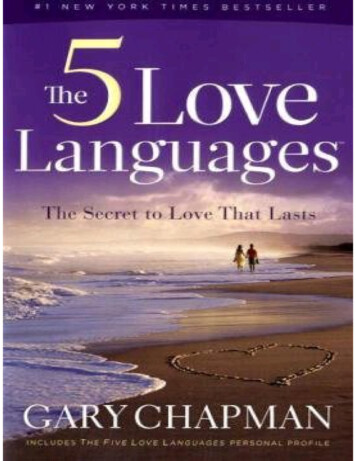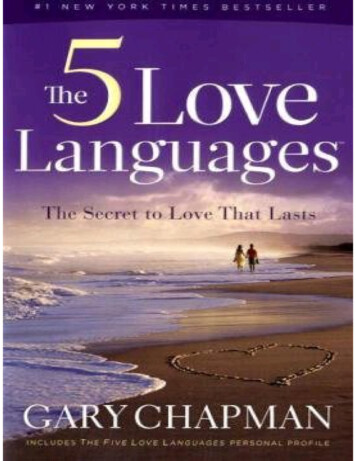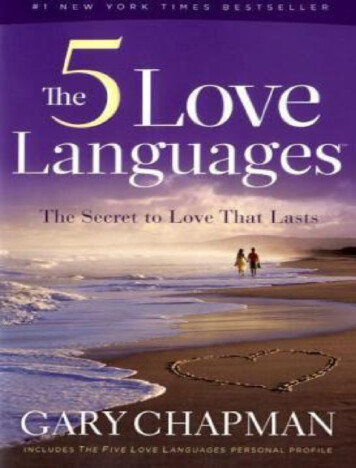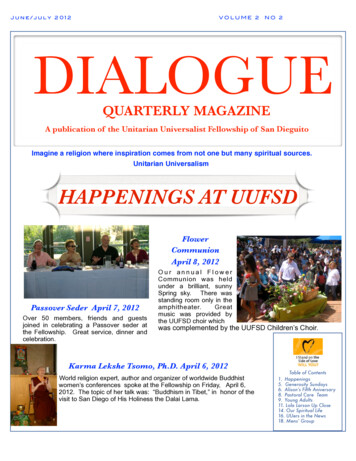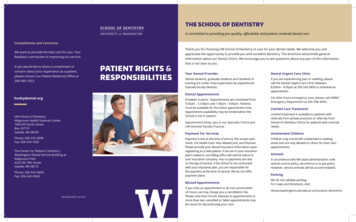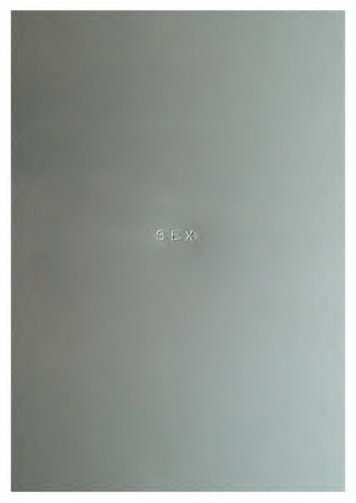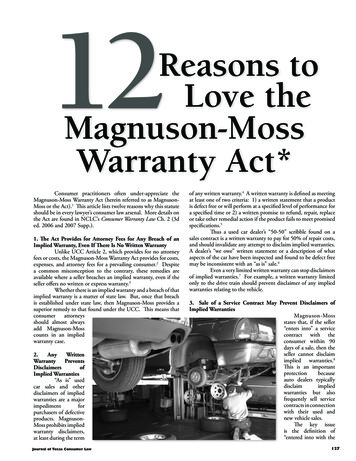
Transcription
12Reasons toLove theMagnuson-MossWarranty Act*Consumer practitioners often under-appreciate theMagnuson-Moss Warranty Act (herein referred to as MagnusonMoss or the Act).1 This article lists twelve reasons why this statuteshould be in every lawyer’s consumer law arsenal. More details onthe Act are found in NCLC’s Consumer Warranty Law Ch. 2 (3ded. 2006 and 2007 Supp.).1. The Act Provides for Attorney Fees for Any Breach of anImplied Warranty, Even If There Is No Written WarrantyUnlike UCC Article 2, which provides for no attorneyfees or costs, the Magnuson-Moss Warranty Act provides for costs,expenses, and attorney fees for a prevailing consumer.2 Despitea common misconception to the contrary, these remedies areavailable where a seller breaches an implied warranty, even if theseller offers no written or express warranty.3Whether there is an implied warranty and a breach of thatimplied warranty is a matter of state law. But, once that breachis established under state law, then Magnuson-Moss provides asuperior remedy to that found under the UCC. This means thatconsumer attorneysshould almost alwaysadd Magnuson-Mosscounts in an impliedwarranty ied Warranties“As is” usedcar sales and otherdisclaimers of impliedwarranties are a majorimpedimentforpurchasers of defectiveproducts. MagnusonMoss prohibits impliedwarranty disclaimers,at least during the termJournal of Texas Consumer Lawof any written warranty.4 A written warranty is defined as meetingat least one of two criteria: 1) a written statement that a productis defect free or will perform at a specified level of performance fora specified time or 2) a written promise to refund, repair, replaceor take other remedial action if the product fails to meet promisedspecifications.5Thus a used car dealer’s “50-50” scribble found on asales contract is a written warranty to pay for 50% of repair costs,and should invalidate any attempt to disclaim implied warranties.A dealer’s “we owe” written statement or a description of whataspects of the car have been inspected and found to be defect freemay be inconsistent with an “as is” sale.6Even a very limited written warranty can stop disclaimersof implied warranties.7 For example, a written warranty limitedonly to the drive train should prevent disclaimer of any impliedwarranties relating to the vehicle.3. Sale of a Service Contract May Prevent Disclaimers ofImplied WarrantiesMagnuson-Mossstates that, if the seller“enters into” a servicecontract with theconsumer within 90days of a sale, then theseller cannot disclaimimplied warranties.8This is an importantprotectionbecauseauto dealers typicallydisclaimimpliedwarranties but alsofrequently sell servicecontracts in connectionwith their used andnew vehicle sales.The key issueis the definition of“entered into with the127
consumer.” Clearly, if a dealer sells and Since many auto and5.Even If Enforceable, theowns a service contract, it has entered into manufactured home dealers Arbitration Requirement Must Bethe contract with the consumer. Similarly,Placed in the Written Warrantyare including mandatoryif the dealer hires an administrator toEven the Eleventh Circuit refuses tohandle claims and other paperwork, the arbitration clauses in allrequire arbitration of written warrantydealer still enters into the contract if it is their consumer contracts,disputes where the arbitrationcontractually obligated to pay the claims.requirement is not disclosed in theIt is thus important to delve beneath the this presented an important written warranty.15 Magnuson-Mossname on a service contract (who might advantage for raisingthus provides a second basis to defeatonly be the administrator) and determinea mandatory arbitration requirement,who in fact owns the contract and is Magnuson-Moss claims.even where a court finds Magnusonobligated to pay claims.Moss not to conflict with a mandatoryLess clear is a common situation where a dealer sellsarbitration provisionanother company’s service contract and makes a sizeable profit onThis is a particularly important Magnuson-Moss applicationthe transaction or services the vehicle and is paid by the companybecause arbitration clauses are rarely placed in the writtenowning the contract for that service. The case law as to whetherwarranty, meaning written warranty disputes typically need notsuch a dealer has “entered into” a service contract is somewhatbe arbitrated.16 Moreover, merely placing the arbitration clausemixed.in the written warranty may not be enough to make the clauseSeveral cases find that a dealer selling someone else’senforceable, particularly where the consumer never sees the writtenservice contract does not “enter into” a contract with thewarranty until after the purchase. To be safe, the seller may haveconsumer.9 Other courts have found that, where service mustto include the arbitration requirement in the sales agreement andbe obtained from that dealer, the dealer enters into a contract.10also disclose it in the warranty.Other factors may suggest that the dealer has entered into thecontract even when it does not own the contract.116. Magnuson-Moss Loosens Many Privity RequirementsTo maximize chances of a favorable ruling, discovery isSome states still require that a consumer be in privity with theessential. Does the contract specify an “issuing dealer”? Mustdefendant in a UCC breach of warranty case. Magnuson-Mossthe service be performed at the dealer? Has the dealer signedloosens these rules to a significant extent. The Act gives a remedydocuments related to the service contract and what is the dealer’sto any consumer damaged by the warranty breach, thus includingcontractual relationship with the service contract owner? Doessubsequent transferees of the product, largely eliminating statethe dealer decide who receives a service contract and at whathorizontal privity requirements.price? Are the contract owner and the dealer both owned by theMagnuson-Moss also eliminates state vertical privitysame individual? Is a portion of the service contract premiumsrequirements in written warranty cases, allowing the consumer toput into a reserve account to be paid to the dealer if losses aresue manufacturers and other indirect sellers. While many courtsbelow a certain level? Is the service contract premium declared bydo not view Magnuson-Moss as expanding state vertical privitythe dealer on its taxes as income?requirements as to implied warranties, at least Illinois courts do soif there is a written warranty.174. More Courts Are Refusing to Require Arbitration ofMagnuson-Moss Written Warranty Claims7. Magnuson-Moss Written Warranties May Exist Even WherePrior to 2002, it appeared that Magnuson-Moss claimsa Court Might Find No Express Warranty Existscould not be forced into binding arbitration because of the Act’sThe definition of a written warranty does not depend onlanguage and legislative history and, most particularly, becausestate law.18 Thus any idiosyncratic state interpretation of theof an FTC rule that explicitly prohibits binding arbitration ofUCC’s express warranty provisions is largely irrelevant to thewritten warranty disputes.12 Since many auto and manufacturedinterpretation of written warranties under Magnuson-Moss.home dealers are including mandatory arbitration clauses in allUnder the UCC, a representation relating to the goods thattheir consumer contracts, this presented an important advantagebecomes part of the basis of the bargain creates an express warrantyfor raising Magnuson-Moss claims.that the goods shall conform to the representation.19 Some recentIn 2002, both the Fifth and Eleventh Circuits founddecisions have narrowly construed this definition, holding thatcongressional intent to be the opposite of what had previouslya manufacturer’s standard new car warranty is not an expressbeen assumed, and refused to give any deference to the FTC rule.13warranty if it promises only that the manufacturer will repair theFor a time, this seemed to spell the death knell for the argumentgoods, without explicitly describing the goods as free from defectsthat binding arbitration was inconsistent with the Magnusonor warranting that the goods are free from defects.20Moss.These decisions can be criticized for their failure to recognizeRecently, though, a number of courts have taken anotherthat implicit within the repair promise is an assurance that thelook at the issue and have found fault with the Fifth and Eleventhgoods will conform to a defect-free standard. But, even if a courtCircuit’s reasoning and description of the Act’s legislative history.finds there is no express warranty, a repair or replace warrantyAs a result, a new crop of cases has found a binding arbitrationclearly meets the Magnuson-Moss’ definition of “writtenrequirement to be inconsistent with a Magnuson-Moss writtenwarranty.” Another example of a written warranty that may notwarranty claim.14be an express warranty is a “we owe” form where a dealer promisesBecause of the contrary precedent from the Fifth andto fix or replace specific features of a car.21Eleventh Circuits, practitioners must be prepared for extensivebriefing on this issue. The arguments for the consumer are set out8. Magnuson-Moss Revocation of Acceptance May Be Superiorin some detail and a sample brief is found at NCLC’s Consumerto UCC Article 2 RevocationArbitration Agreements § 4.2.2, Appx. G (5th ed. 2007). TheRevoking acceptance using Magnuson-Moss offers certainbrief is also found in MS Word on the Companion CD-Rom.advantages over a UCC revocation. The consumer should be ableto recover attorney fees in a Magnuson-Moss action to enforce128Journal of Texas Consumer Law
the revocation. In addition, Magnuson-Moss revocation may beavailable where UCC revocation is not.One important example is where the immediate seller haseffectively disclaimed implied warranties, and the consumerthus seeks to revoke acceptance as to the manufacturer or otherindirect seller. In at least some states, courts refuse to allowUCC revocation against an indirect seller. But, since MagnusonMoss more explicitly provides for remedies against remote sellersoffering written warranties (see #6, supra), Magnuson-Mossrevocation may be available against these indirect sellers whereUCC revocation is not.22One issue though is whether Magnuson-Moss authorizesrevocation as a remedy. The Act explicitly states that the consumercan sue for equitable relief,23 and some courts have viewed thisprovision as authority to entertain suits for rejection or revocationof acceptance.24Tying rejection or revocation of acceptance to equitable relief,however, could lead a court to require the consumer to meetsuch equitable standards as irreparable injury and absence of anadequate remedy at law.25 Unlike rescission, which is an equitableremedy, most courts hold that revocation of acceptance is a remedyat law.26 The Act’s general authorization of suits for damagesis sufficient to encompass a suit for revocation of acceptance,because a revocation award can be expressed as a money judgment,conditioned upon the return of the goods if the consumer hasnot already done so.27 Even if a suit for revocation of acceptancewere not a suit for damages, it would be encompassed by the Act’sauthorization of “other legal . relief.”28Some courts have suggested that, because the Act explicitlyrequires only a full warrantor to provide a refund or replacement(if it fails to remedy defects after a reasonable number of attempts),revocation of acceptance is not an available remedy under the Actfor breach of a limited warranty.29 This reasoning confuses twoseparate rules.Magnuson-Moss, like the typical state lemon law, provides anaffirmative right to a refund or replacement for certain warrantiesin certain circumstances, so that the consumer need not prove allthe elements required by the UCC for revocation of acceptance.But when this special right does not apply, the legislative historymakes it clear that Congress intended courts to look to state lawto determine the buyer’s remedies.30 If the buyer meets the UCCrequirements for revocation of acceptance, then the buyer shouldbe entitled to that remedy under the Magnuson-Moss Act.was improper or that the notice was sent to the wrong party,the consumer can still proceed under agnuson-Moss yearsafter the breach occurred. The consumer instead engages ininformal dispute resolution. If that is not required, then theconsumer instead offers a right to cure.Moreover, the Magnuson-Moss preconditions maynot be that onerous. The consumer need not resort to disputeresolution if either the requirement is not disclosed in the writtenwarranty or the mechanism does not qualify under various FTCstandards.31 In addition, offering the right to cure should notbe seen as an impediment. Many consumers have already giventhe seller a right to cure when they asked for repairs under thewarranty. If a repair will not resolve the problem, the seller canonly comply with a right to cure by replacing the product with anon-defective one.10. The Act Applies to LeasesAn important Magnuson-Moss application is toautomobile and other personal property leases. Statutes in somestates providing consumer warranty rights, such as certain lemonlaws or statutes limiting disclaimer of implied warranties, do notapply to leases. Magnuson-Moss has an important role filling inthese gaps.Although the Act’s language is somewhat convoluted asit applies to leases, a growing majority of cases find that the Actdoes in fact apply to lease transactions.32 Most cases finding nocoverage are either older33 or rely on unusual facts.34 Nevertheless,because of the complexity of the Act’s coverage language as itapplies to leases, it is recommended that close attention be paidto the analysis found in NCLC’s Consumer Warranty Law § 2.2.5(3d ed. 2006 and 2007 Supp.).11. The Magnuson-Moss Statute of Limitations Is Just AsLong As the UCC’sMany federal consumer protection statutes have short statutesof limitations. Magnuson-Moss, on the other hand, has no explicitstatute of limitations, and courts typically apply the UCC’s fouryear limitation period.3512. Magnuson-Moss Gives Consumers More Control OverWhether an Action Is Heard in State or Federal CourtMagnuson-Moss presents consumer litigants withunusual rules as to federal court jurisdiction. It is harder to getinto federal court than for cases presenting other federal consumer9. Magnuson-Moss Does Not Require Notice of a Breachprotection claims, but easier than under a state law warranty claim.An element of a UCC Article 2 warranty case is thatImportantly, the consumer, not the defendant, controls whether athe consumer must have provided notice of the warranty breach.case can be removed from state to federal court.Magnuson-Moss also contains preconditions to litigation, butA consumer can obtain federal court jurisdiction underthese are different than those for UCCMagnuson-Moss by claiming at leastArticle 2 cases. If an alternative dispute Magnuson-Moss, like the 50,000 in economic damages. This ismechanism is disclosed in the written typical state lemon law,a lower threshold than federal diversitywarranty and it qualifies under FTC rules,jurisdiction which requires 75,000.then the consumer must resort to this non- provides an affirmativeDiversity of the parties need not bebinding mechanism before instituting suit. right to a refund orshown.If a qualifying mechanism is not disclosed,Moreover, individual claims can bereplacement for certainthen the consumer must give the warrantorjoined to reach the 50,000 threshold.36warranties in certaina right to cure.Joinder must comply with Federal Rule ofWhiletheseMagnuson-Moss circumstances, so thatCivil Procedure 20, which allows joinderpreconditions may be more onerous thanif the plaintiffs’ claims arise out of themere notice of the breach, Magnuson- the consumer need notsame transaction, occurrence, or series ofMoss is an important option where prove all the elementstransactions or occurrences, and there isthe consumer did not meet the UCC required by the UCCat least one common question of law ornotice requirement. When timelinessfact. Thus joinder should be allowed, forof notice of the breach is at issue, or the for revocation ofexample, if the plaintiffs all are complainingdefendant claims the form of notice acceptance.about the same defect.Journal of Texas Consumer Law129
On the other hand, the consumer can keep out of federalcourt in a Magnuson-Moss case simply by seeking less than 50,000 in the complaint and not joining the case with otherswho might bring the total amount sought above that amount.Then there will be no basis under Magnuson-Moss to remove thecase to federal court.* This article is reprinted with permission from The NationalConsumer Law Center, Inc. For more information about NCLCpublications, visit www.consumerlaw.org/shop.1. 15 U.S.C. §§ 2301–2312.2. Id. § 2310.3. NCLC, Consumer Warranty Law § 2.3.1 (3d ed. 2006 and2007 Supp.).4. 15 U.S.C. § 2308.5. 15 U.S.C. § 2301(6); 16 C.F.R. § 700.3.6. Hamilton v. O’Connor Chevrolet, Inc., 2005 WL 3109149(N.D. Ill. Nov. 16, 2005); Horton Homes, Inc. v. Brooks, 832 So.2d 44 (Ala. 2001); Griffs v. Leisure Tyme RV, Inc., 884 So. 2d 241(Fla. Dist. Ct. App. 2004); Marine Midland Bank v. Carroll, 98A.D.2d 516 (N.Y. App. Div. 1984).7. Cf. Kimpel v. Del. Pub. Auto Auction, 2001 WL 1555932(Del. Ct. Com. Pl Mar. 6, 2001) (very limited service contract).8. 15 U.S.C. § 2308(a).9. See Priebe v. Autobarn Ltd., 240 F.3d 584 (7th Cir. 2001);Computer Network, Inc. v. AM Gen. Corp., 696 N.W.2d 49(Mich. Ct. App. 2005).10. Patton v. McHone, 822 S.W.2d 608 (Tenn. Ct. App. 1991).See also Letter from Allen W. Hile, Jr., Assistant Dir., Div. of Mktg.Practices, Fed. Trade Comm’n, to Jean Noonan, ClearinghouseNo. 55,632 (Feb. 21, 2005); Gen. Motors Acceptance Corp. v.Jankowitz, 523 A.2d 695 (N.J. App. Div. 1987).11. See Johnson v. Earnhardt’s Gilbert Dodge, Inc., 132 P.3d825 (Ariz. 2006); Villaneuva v. Toyota Motor Sales, U.S.A., Inc.,869 N.E.2d 866 (Ill. App. Ct. 2007).12. See NCLC’s Consumer Arbitration Agreements § 4.2.2 (5thed. 2007).13. Walton v. Rose Mobile Homes, L.L.C., 298 F.3d 470 (5thCir. 2002); Davis v. Southern Energy Homes, Inc., 305 F.3d 1268(11th Cir. 2002).14. See Higgs v. The Warranty Group, 2007 WL 2034376 (S.D.Ohio July 11, 2007); Rickard v. Teynor’s Homes, Inc., 279 F. Supp.910 (N.D. Ohio 2003); Browne v. Kine Tysons Imports, Inc.,190 F. Supp. 2d 827 (E.D. Va. 2002); Koons Ford of Baltimore,Inc. v. Lobach, 919 A.2d 722 (Md. 2007); Simpson v. MSA ofMyrtle Beach, Inc., 644 S.E.2d 663 (S.C. 2007); Tucker v. FordMotor Co., 2007 Va. Cir. LEXIS 24 (Va. Cir. Ct. Feb. 1, 2007).15. Cunningham v. Fleetwood Homes of Georgia, Inc., 253F.3d 611 (11th Cir. 2001); see also Harnden v. Ford Motor Co.,408 F. Supp. 2d 300 (E.D. Mich. 2004); DaimlerChrysler Corp.v. Mathews, 848 A.2d 577 (Del. Ch. Ct. 2004); Larrain v. BengalMotor Co., Ltd., 2008 WL 183495 (Fla. Dist. Ct. App. Jan. 23,2008); Tropical Ford, Inc. v. Major, 882 So. 2d 476 (Fla. Dist.Ct. App. 2004); Manly v. Daimler Chrysler Corp., ClearinghouseNo. 55,633 (Mich. Cir. Ct. Aug. 30, 2005). Oddly, the onlytwo contrary cases are out of the Eleventh Circuit, thus ignoringthe precedent in Cunningham: Patriot Mfg., Inc. v. Dixon, 399F. Supp. 2d 1298 (S.D. Ala. 2005); Patriot Mfg., Inc. v. Jackson,2005 WL 3086668 (Ala. Nov. 18, 2005).16. Id.17. See NCLC’s Consumer Warranty Law § 2.3.5 (3d ed. 2006and 2007 Supp.).18. Compare 15 U.S.C. § 2301(6) with 15 U.S.C. § 2301(7).13019. U.C.C. § 2-313(1).20. See NCLC, Consumer Warranty Law § 3.2.2.4.2 (3d ed.2006 and 2007 Supp.).21. Hamilton v. O’Connor Chevrolet, Inc., 399 F. Supp. 860(N.D. Ill. 2005).22. Sheehan v. Monaco Coach Corp., 2006 WL 208689(E.D. Wis. Jan. 25, 2006); Mydlach v. DaimlerChrysler Corp.,2005 WL 2414352 (Ill. App. Ct. Sept. 30, 2005); Shuldmanv. DaimlerChrysler Corp., 1 A.D.3d 343, 768 N.Y.S.2d 214(2003); Gochey v. Bombardier, Inc., 153 Vt. 607, 572 A.2d 921,11 U.C.C. Rep. Serv. 2d 870 (1990).23. 15 U.S.C. § 2310(d)(1).24. Hamdan v. Land Rover N. Am., Inc., 2003 WL 21911244(N.D. Ill. Aug. 8, 2003); Jones v. Fleetwood Motor Homes, 1999WL 999784 (N.D. Ill. Oct. 29, 1999); Holland v. Baja MarineCorp., 1999 Del. Super. LEXIS 512 (Del. Super. Ct. Nov. 3,1999); Mydlach v. DaimlerChrysler Corp., 846 N.E.2d 126 (Ill.App. Ct. 2005) (characterizing revocation under Magnuson-MossAct as equitable, but without discussion), appeal allowed, 857N.E.2d 674 (Ill. 2006). See also Peacock v. Damon Corp., 2006WL 2711762 (W.D. Ky. Sept. 20, 2006) (allowing MagnusonMoss revocation claim to go to jury). But cf. Stoebner Motors,Inc. v. Automobili Lamborghini S.P.A., 459 F. Supp. 2d 1028 (D.Haw. 2006) (revocation not available against remote manufacturerwithout privity); Chaurasia v. Gen. Motors Corp., 126 P.3d 165(Ariz. Ct. App. 2006) (Magnuson-Moss Act’s authorization ofequitable relief does not, in the absence of privity, allow consumerto revoke acceptance against manufacturer).25. Jones v. Fleetwood Motor Homes, 127 F. Supp. 2d 958,962, 967 (N.D. Ill. 2000) (erroneously concluding that claim forrevocation must be treated as one for equitable relief, so plaintiffmust show absence of adequate remedy at law; only MagnusonMoss case cited for this proposition is one seeking an injunction,not revocation); see also NCLC’s Consumer Warranty Law § 8.1.4(3d ed. 2006 and 2007 Supp.).26. See NCLC, Consumer Warranty Law § 8.1.4 (3d ed. 2006and 2007 Supp.).27. See Long v. Monaco Coach Corp., 2006 WL 2564040 (E.D.Tenn. Aug. 31, 2006) (Magnuson-Moss Act makes refund availablefor full warranty; revocation is available for limited warrantyif state law allows, but lack of privity with remote seller bars ithere); Larry J. Soldinger Assocs., Ltd. v. Aston Martin Lagondaof N. Am., Inc., 1999 WL 756175 (N.D. Ill. Sept. 10, 1999)(recognizing consumer’s right to bring Magnuson-Moss claimfor revocation of acceptance); Ward v. Tupelo Auto Sales, 1998U.S. Dist. LEXIS 19074 (N.D. Miss. Nov. 20, 1998) (claim forreimbursement of purchase price falls within category of damagesfor economic loss which are recoverable under Magnuson-Moss);Gochey v. Bombardier, Inc., 153 Vt. 607, 527 A.2d 921 (1990)(revocation is available as a Magnuson-Moss remedy if it wouldbe available under state law); see also Golden v. Gorno Bros., Inc.,410 F.3d 879, 884 (6th Cir. 2005) (contrasting rescission withrevocation of acceptance; announcing formula for determiningamount in controversy when revocation is sought in MagnusonMoss suit); Milicevic v. Fletcher Jones Imports, Ltd., 402 F.3d912 (9th Cir. 2004) (Nev. law) (affirming award of purchase priceof car, minus value of reasonable use, under Magnuson-MossAct); Gusse v. Damon Corp., 2007 WL 127804 (C.D. Cal. Jan.17, 2007) (revocation or restitution is available under MagnusonMoss Act because it is available under Song-Beverly Act); Hines v.Mercedes-Benz USA, L.L.C., 358 F. Supp. 2d 1222, 1235 (N.D.Ga. 2005) (consumer can seek revocation under Magnuson-MossAct, but not shown here; no discussion of whether it is equitableor legal remedy).28. 15 U.S.C. § 2310(d)(1).Journal of Texas Consumer Law
29. See Holmes v. Kabco Builders, Inc., 62 U.C.C. Rep. Serv.2d 239, 244 n.7 (S.D. Ala. 2007); Traynor v. Winnebago Indus.,Inc., 2006 WL 778703 (D. Ariz. Mar. 27, 2006).30. H.R. Rep. No. 93-1107 (1974), reprinted in 1974U.S.C.C.A.N. 7702, 7706 (“Warranties are currently governedby common law and the Uniform Commercial Code. . In thejurisdictions where [the UCC] is in effect, it generally controls therights of parties in commercial transactions and it is commonlyaccepted as today’s law of sales.”).31. See NCLC, Consumer Warranty Law § 2.8 (3d ed. 2006and 2007 Supp.).32. See e.g. Voelker v. Porsche Cars N. Am., Inc., 353 F.3d 516(7th Cir. 2003); Cohen v. AM Gen. Corp., 264 F. Supp. 2d 616(N.D. Ill. 2003); Mago v. Mercedes-Benz, U.S.A., Inc., 142 P.3d712 (Ariz. Ct. App. 2006); Am. Honda Motor Co. v. Cerasani,Journal of Texas Consumer Law955 So. 2d 543 (Fla. 2007); Freeman v. Hubco Leasing, 324S.E.2d 462 (Ga. 1985); Mattuck v. DaimlerChrysler Corp., 366Ill. App. 3d 1026, 852 N.E.2d 485 (2006); Ryan v. Am. HondaMotor Corp., 896 A.2d 454 (N.J. 2006); Szubski v. MercedesBenz, U.S.A., L.L.C., 796 N.E.2d 81 (Ohio Ct. Com. Pl. 2003);Henderson v. Benson-Hartman Motors, Inc., 33 Pa. D. &C.3d 6, 41 U.C.C. Rep. Serv. 782, 794 (C.P. 1983); Peterson v.Volkswagen of Am., Inc., 697 N.W.2d 61 (Wis. 2005).33. See, e.g., Alpiser v. Eagle Pontiac-GMC-Isuzu, Inc., 97 N.C.App. 610, 389 S.E.2d 293 (1990).34. Parrot v. DaimlerChrysler Corp., 130 P.3d 530 (Ariz.2006).35. See NCLC, Consumer Warranty Law § 2.7.8 (3d ed. 2006and 2007 Supp.).36. Id. § 2.7.2.131
Warranty Act* Consumer practitioners often under-appreciate the Magnuson-Moss Warranty Act (herein referred to as Magnuson-Moss or the Act).1 This article lists twelve reasons why this statute should be in every lawyer's consumer law arsenal. More details on the Act are found in NCLC's Consumer Warranty Law Ch. 2 (3d ed. 2006 and 2007 Supp.).


